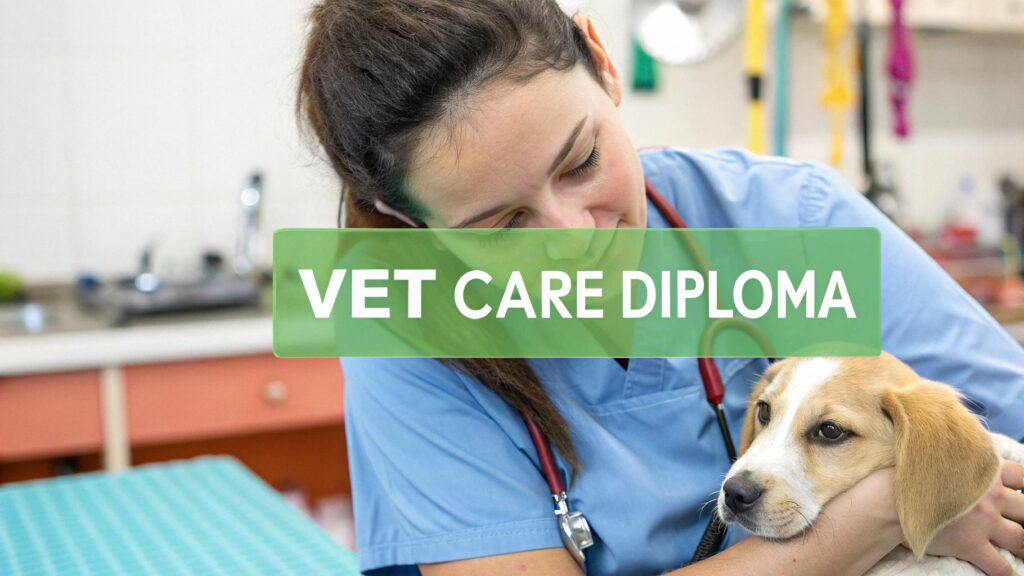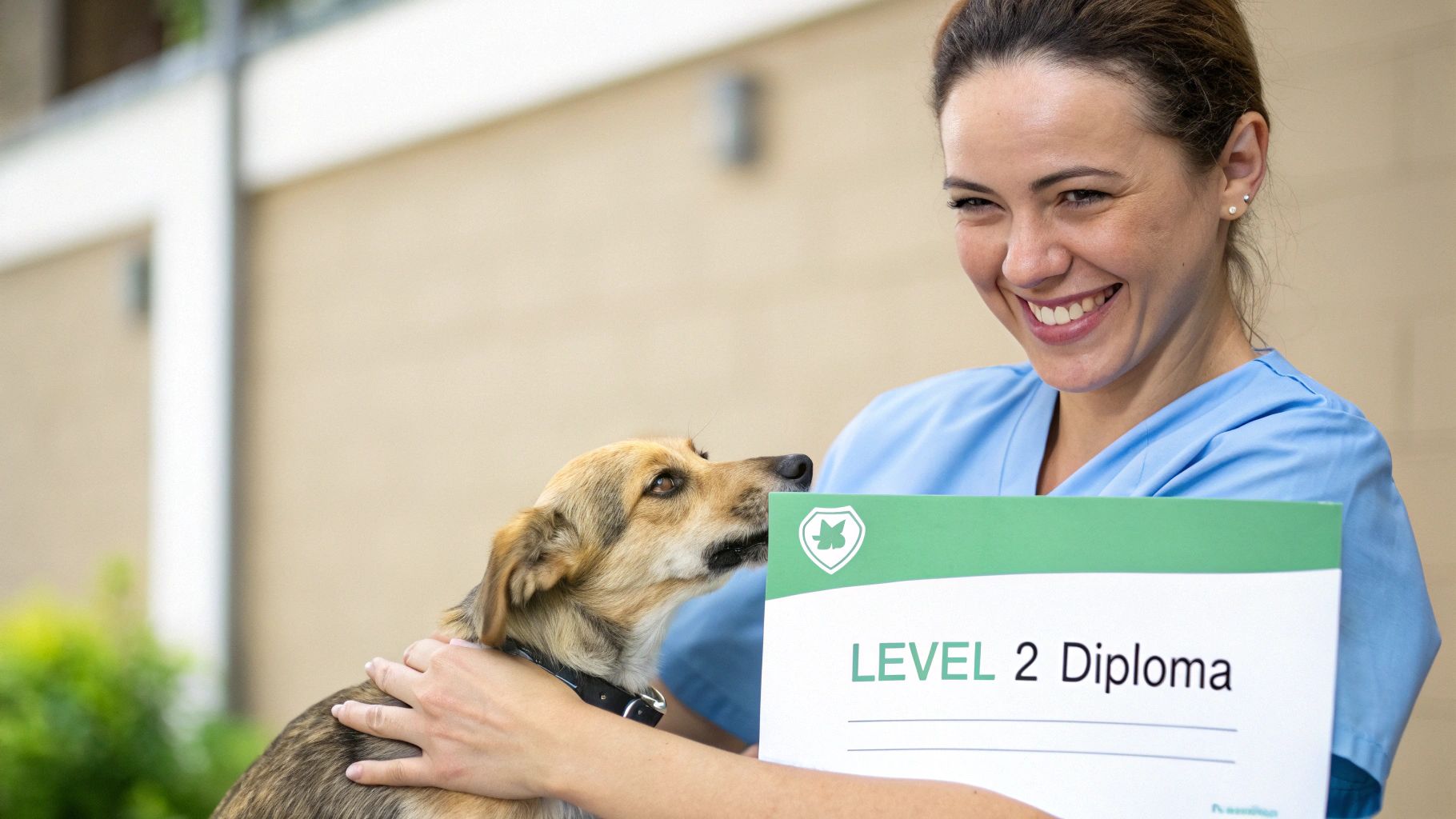
Love animals and dream of turning that passion into a career? If you're looking for the perfect first step into the professional world of animal health, the Level 2 Diploma for Veterinary Care Assistants is designed for you. This qualification gives you the foundational knowledge and skills to become an invaluable member of any veterinary team from day one.
What is a Veterinary Care Assistant? The Heart of the Practice

Picture a busy veterinary clinic. While vets and registered nurses focus on complex medical procedures, another professional works tirelessly to keep everything running like clockwork. That person is the Veterinary Care Assistant (VCA) – an essential figure who provides the backbone of support for the entire practice.
A VCA's role is incredibly varied, blending hands-on animal care with vital administrative and support tasks. You are often the first friendly face a pet and their worried owner sees, offering reassurance and helping create a calm, welcoming atmosphere. Your work directly supports every member of the veterinary team, freeing up vets and nurses to concentrate on the demanding medical work only they can perform.
A Day in the Life of a VCA
No two days are ever the same for a Veterinary Care Assistant. The role demands adaptability, compassion, and a strong work ethic. Your key responsibilities would likely include:
-
Direct Animal Care: Ensuring all animal patients are comfortable, well-fed, and have clean living quarters. This also involves exercising animals and closely monitoring their general wellbeing.
-
Clinical Support: Assisting vets and nurses by preparing surgical instruments, sterilising equipment, and safely holding animals during examinations and treatments.
-
Maintaining Hygiene: Keeping the entire clinic, from waiting rooms to operating theatres, exceptionally clean. This is crucial for preventing infection and protecting both patients and staff.
-
Client Communication: Managing appointments, keeping patient records up-to-date, and providing basic advice to pet owners under the guidance of the veterinary team.
This mix of duties makes being a VCA both challenging and deeply rewarding. It’s a role where a profound love for animals meets real, practical, hands-on skill. To get a feel for the environment, you could look up some local veterinary practices and see this role in action.
A skilled Veterinary Care Assistant is truly indispensable. They provide the support structure that allows a veterinary practice to deliver high-quality, compassionate care efficiently and safely.
To thrive in this fast-paced environment, you need proper training. A qualification like the Level 2 Diploma for Veterinary Care Assistants gives you the structured knowledge to carry out these duties with confidence and competence, making it the perfect launchpad into this fulfilling career.
Why Stonebridge College's Diploma is Your Ideal First Step

Ready to start your journey? The Level 2 Diploma for Veterinary Nursing Assistants (RQF) from Stonebridge College is your official entry point into the professional world of animal health. This qualification is specifically designed to give you the exact skills and knowledge that veterinary practices across the UK are looking for.
Think of a 'Level 2' qualification as the essential groundwork. It confirms you have a rock-solid grasp of the core principles everyone in the industry needs to know – from animal welfare and hygiene to safe handling. This diploma isn't just about theory; it’s about preparing you for the real-world demands of a busy clinic and building your confidence.
Who Is This Diploma For?
If you have a genuine love for animals and you’re ready to turn that passion into a proper career, this course is for you. Entry requirements often focus more on your dedication and hands-on attitude than on a long list of academic grades, making it a truly accessible pathway.
The Level 2 Diploma for Veterinary Nursing Assistants (RQF) is a nationally recognised qualification for anyone aged 16 and over. The main requirement is a commitment to learning and a passion for animal care. This focus on accessibility is brilliant because it means a fulfilling career is within reach for so many people. As you get started, soaking up extra information from resources like a complete guide to pet care can give you a fantastic head start.
Building Your Foundation For Success
The diploma is carefully structured to give you a complete overview of what it takes to be an outstanding VCA. You'll learn the 'why' behind the daily tasks, from understanding basic animal anatomy to mastering critical infection control procedures. This knowledge is what transforms you from a well-meaning animal lover into a true professional.
The Level 2 Diploma acts as your passport into the veterinary industry. It demonstrates to employers that you are serious about your career and have invested in learning the professional standards required to provide excellent care.
Finishing this course is a clear signal to any vet practice that you’re ready to be a valuable member of their team from day one. It's also a fantastic stepping stone for further education. For many, becoming a VCA is the first step on the path to becoming a Registered Veterinary Nurse, and our guide on how to become a veterinary nurse can show you exactly what that journey looks like.
What You Will Learn with Stonebridge College
So, you're passionate about animals and considering a career in veterinary care? The Level 2 Diploma for Veterinary Nursing Assistants (RQF) is designed to take that passion and shape it into a set of genuine, professional skills you'll use every single day in a busy practice. This isn't just about textbook theory; each part of the course translates directly into real-world abilities.
Think of it as the bridge between simply loving animals and becoming a competent, confident member of a professional veterinary team. You'll gain everything from front-of-house administrative know-how to the hands-on essentials of patient care. One moment you could be learning the correct, safe way to handle a nervous cat, and the next you'll be diving into the fundamentals of animal anatomy or mastering infection control protocols that keep patients and staff safe.
Core Competencies You Will Master
The course is cleverly structured to build your knowledge from the ground up, making sure you feel fully prepared for the workplace from day one. It's packed with practical skills you can actually use, like interpreting dog body language, which is absolutely crucial for safe handling and getting an accurate read on a patient.
You'll get to grips with a whole host of key areas, including:
-
Animal Handling and Care: Learn how to approach, restrain, and look after different species with both compassion and confidence.
-
Veterinary Terminology: Get fluent in the language used in a clinical setting so you can communicate clearly and effectively with the rest of the team.
-
Infection Control: Understand the critical importance of hygiene and sterilisation to prevent the spread of disease within the practice.
-
Administrative Duties: Master the skills needed to manage appointments, keep patient records up to date, and handle client communications like a pro.
Core Skills Gained Through the Level 2 Diploma
To give you a clearer picture, here's a breakdown of the essential skills you'll acquire during the course and why they're so vital in a modern veterinary practice.
|
Skill Area |
What You Will Learn |
Why It Is Important in a Vet Practice |
|---|---|---|
|
Practical Animal Handling |
Safe and compassionate techniques for restraining and moving various species, including dogs, cats, and rabbits. |
Reduces stress for the animal and ensures the safety of both the patient and the veterinary team during examinations and procedures. |
|
Clinical Environment Management |
Principles of infection control, sterilisation of equipment, and maintaining a hygienic environment. |
Prevents the spread of infectious diseases, protecting vulnerable patients and maintaining high standards of care. |
|
Patient Care & Welfare |
How to monitor patients, provide basic post-operative care, administer medication under supervision, and understand animal welfare laws. |
Ensures patients are comfortable, recovering well, and receiving the best possible care according to legal and ethical standards. |
|
Administrative & Client Skills |
Managing appointments, updating records, handling payments, and communicating effectively with pet owners. |
Keeps the practice running smoothly and provides a positive, reassuring experience for clients who are often worried about their pets. |
|
Veterinary Terminology & Anatomy |
The language of veterinary medicine, including common terms for conditions, procedures, and basic animal anatomy. |
Allows you to understand instructions from vets and nurses, contribute effectively to team discussions, and accurately record information. |
As you can see, the diploma gives you a well-rounded skill set, making you an indispensable part of the team right from the start.
By finishing this course, you're gaining far more than just a certificate. You're building a foundation of knowledge that empowers you to provide excellent care and support. You'll become a truly valuable asset to any practice from your very first day.
Study Online, On Your Terms
Finding the time to go back to college can feel impossible when you're juggling a job, family, and everything else life throws at you. A rigid classroom schedule often isn't an option. That’s why Stonebridge College delivers the Level 2 Diploma for Veterinary Nursing Assistants (RQF) online, giving you complete control over your learning.
You have the freedom to decide when and where you study. Whether you're catching up on coursework late at night or squeezing in a lesson on your lunch break, the learning platform is ready when you are. You set the pace.
A Flexible Way to Pay with a Monthly Subscription
Cost can be a major barrier to education. Stonebridge College removes this hurdle with a flexible monthly subscription model. Instead of a large upfront payment or a restrictive credit agreement, you simply pay an affordable monthly fee.
This approach gives you total control:
-
No long-term tie-ins: If your circumstances change, you can pause or cancel at any time.
-
Budget-friendly: Spreading the cost makes planning for your future career far less stressful.
-
Complete flexibility: Take as much or as little time as you need to complete your course, without the pressure of a fixed-term loan.
This model is built for real life, ensuring that your finances don't stand in the way of your career goals. It's a convenient and cost-effective way to gain a recognised qualification.
You're Not Studying Alone
'Distance learning' doesn't mean you're isolated. At Stonebridge College, support is a priority. Every student is assigned a dedicated personal tutor who is an expert in the field. Your tutor is there to guide you through the material, clarify tricky topics, and provide constructive feedback on your work.
Online learning empowers you to take control of your education, fitting it seamlessly into your life without sacrificing quality or support. This flexible model opens doors to new careers for thousands of adult learners every year.
This one-to-one support keeps you motivated and moving forward. If you ever feel stuck or just need some encouragement, your tutor is only an email or phone call away. For a closer look at the advantages, understanding why distance learning is good offers some really valuable insights.
Your Career Path After Graduation

Finishing your Level 2 Diploma for Veterinary Care Assistants is a massive achievement, but it's just the first step on an incredibly rewarding journey. This qualification is your ticket into the animal care industry, giving you the solid foundation of knowledge that employers are actively searching for.
With this diploma, you are perfectly positioned to walk straight into a professional Veterinary Care Assistant (VCA) role. You’ll find opportunities in all sorts of places, from your local small animal practice to large, bustling animal hospitals and even specialist clinics.
Immediate Job Opportunities
Once qualified, you can apply for VCA positions with confidence. Your diploma signals to employers that you understand animal welfare, clinical hygiene, and safe patient handling. You could find yourself starting your career in various settings:
-
General Veterinary Practices: The most common starting point, where you'll assist with routine check-ups, vaccinations, and minor procedures.
-
Animal Hospitals: Larger, often 24/7 facilities that handle more complex cases, offering immense learning opportunities in a fast-paced environment.
-
Specialist Referral Centres: Clinics focusing on specific fields like orthopaedics or cardiology, where you'll support highly specialised veterinary work.
-
Animal Charities and Rescue Centres: Organisations like the RSPCA or Dogs Trust rely on skilled VCAs to care for animals awaiting their forever homes.
This diploma is much more than a piece of paper; it’s your launchpad into a dynamic and growing industry. It proves you’ve got the skills to do the job, opening doors that let you build a career you're truly passionate about.
Long-Term Career Progression
The VCA role is a brilliant career in its own right, but it's also an excellent springboard. Many VCAs use their experience to specialise in areas they're passionate about, such as surgical support or practice management.
For many, the ultimate goal is to become a fully qualified Registered Veterinary Nurse (RVN). Working as a VCA provides invaluable hands-on experience, giving you a huge advantage when you decide to pursue a nursing qualification. It's well worth exploring the different careers in veterinary care to map out what your future could look like.
Financially, there's plenty of room for growth, too. On average, a VCA in the UK can expect to earn around £20,562 a year. With more experience, senior roles can command salaries as high as £37,000 annually.
Your Questions Answered
Taking the first step into a new career is a big decision, so it's natural to have questions. Here are clear, straightforward answers to the most common queries about the Level 2 Diploma for Veterinary Care Assistants.
Do I need practical experience to enrol?
Yes, you do. For the Stonebridge College Level 2 Diploma for Veterinary Nursing Assistants (RQF), you'll need to set up your own placement. It has to be at least 2 weeks long and supervised by a qualified RVN. We suggest starting to look for a placement provider as soon as possible because it might take a while to find one.
How does the subscription model work?
Stonebridge College's subscription model is designed for flexibility. Instead of a large upfront fee or a credit agreement, you pay a simple, affordable monthly fee. This gives you full access to all course materials and dedicated tutor support. The beauty of this model is its freedom; you can pause or cancel your subscription if your circumstances change, allowing you to learn without financial pressure.
It's a flexible way to pay that puts you firmly in the driver's seat of your education. It breaks down the financial barriers, letting you invest in your future at a pace that feels completely comfortable.
What is the difference between a VCA and a vet nurse?
Think of a Veterinary Care Assistant (VCA) as the operational backbone of the veterinary team. VCAs handle animals, manage feeding, ensure hygiene standards are met, and assist with administrative tasks, all under the guidance of vets and nurses. A Registered Veterinary Nurse (RVN), on the other hand, is a regulated professional who takes on more complex clinical duties, such as administering certain medications, monitoring anaesthesia, and performing minor surgical procedures. Many people start as a VCA to gain a brilliant foundation before training to become an RVN.
Can I get a job straight after qualifying?
Absolutely! Completing the Level 2 Diploma for Veterinary Care Assistants gives your CV a serious boost. It provides the solid theoretical knowledge that clinics and animal hospitals look for when hiring. Pairing this recognised qualification with any hands-on experience you've gained will make you a standout candidate for VCA roles in an industry that needs skilled support staff.
Ready to take the first step towards a rewarding career in animal care? At Stonebridge Associated Colleges, our flexible online courses are designed to fit your life. Explore the Level 2 Diploma for Veterinary Nursing Assistants and start your journey today. Find out more at https://www.stonebridge.uk.com.




